Key takeaways:
- Interdisciplinary collaborations enhance creativity and lead to innovative solutions by bringing together diverse perspectives.
- Africa-Europe science collaborations facilitate knowledge exchange, combining local wisdom with technological advancements for effective solutions.
- Clear communication, flexible roles, and patience are crucial for overcoming challenges and ensuring successful interdisciplinary partnerships.
- The future of collaborations holds promise through technology-driven initiatives and educational exchanges, preparing the next generation of researchers.
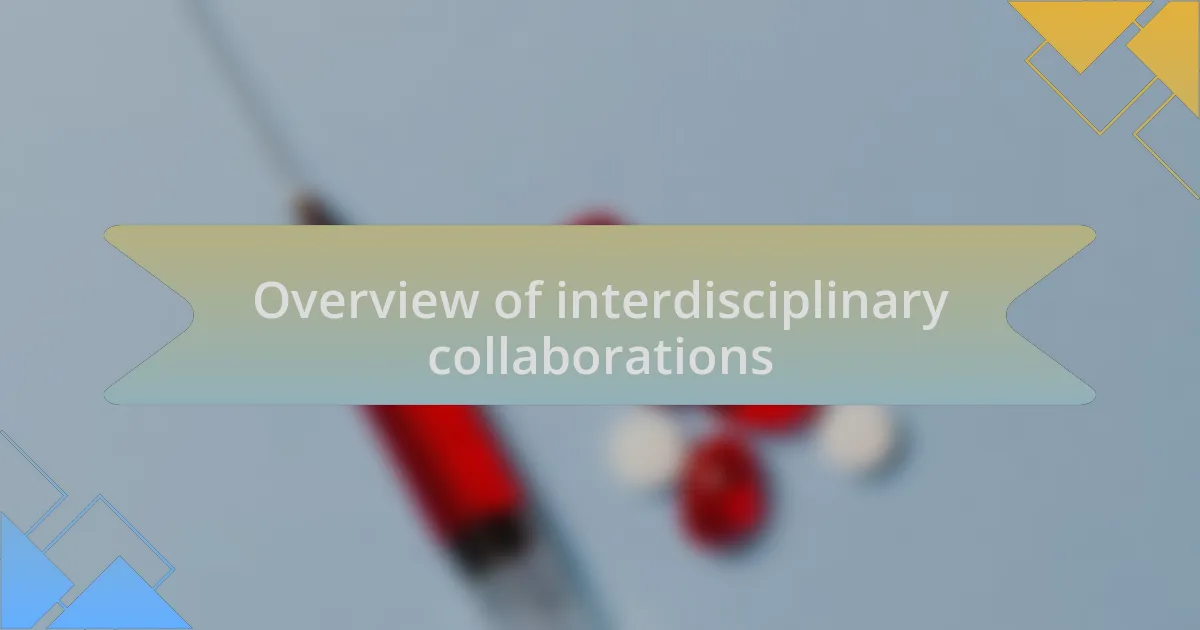
Overview of interdisciplinary collaborations
Interdisciplinary collaborations bring together diverse fields of expertise, breaking down silos that can limit innovation. I remember my first experience when a biologist, an urban planner, and I—a social scientist—teamed up on a project addressing sustainable cities. The blend of perspectives was eye-opening; it made me realize how solutions often lie at the intersection of disciplines, not within their boundaries.
When people from different areas of study collaborate, they unleash creativity and foster a rich environment for learning. It’s fascinating to witness how varied approaches can lead to breakthroughs that no single discipline could achieve alone. Have you ever thought about how a chemistry expert might see a problem differently from a community developer? Each brings a unique lens, and together, they often find novel solutions.
However, these collaborations also pose challenges, such as differing terminologies and communication styles. In one project, we struggled to align our goals initially because each of us spoke our own ‘language’. This experience taught me the importance of patience and open dialogue, which ultimately strengthened our partnership and the project’s outcome. Have you encountered similar challenges? Sharing experiences can help pave the way for smoother collaborations in the future.
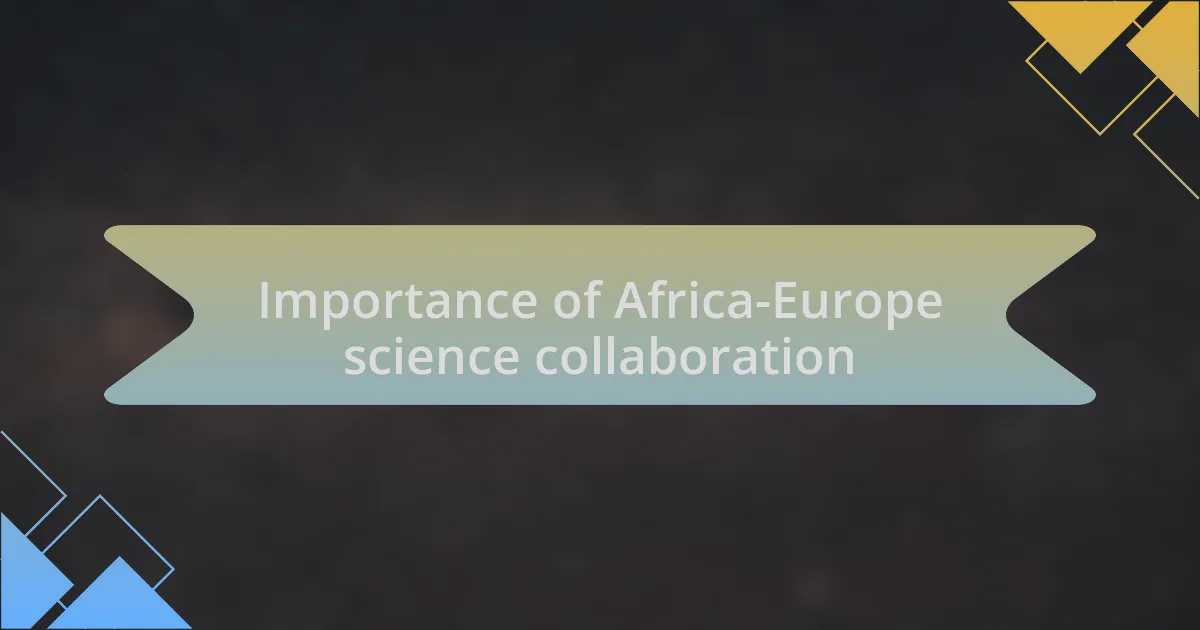
Importance of Africa-Europe science collaboration
Africa-Europe science collaboration serves as a vital bridge, enabling the exchange of knowledge and resources to tackle shared challenges. From my experience, working alongside European researchers has opened doors to innovative methods that can be adapted to local African contexts. This interaction fosters a two-way street of learning where insights flow freely, enhancing the scientific community on both sides.
During a joint project on climate resilience, we integrated local knowledge with European technological advances. I remember vividly the moment when a local environmentalist shared traditional practices that had been effective for centuries. It struck me how vital it is to cultivate an inclusive approach, acknowledging that scientific advancements do not solely stem from high-tech solutions, but also from the wisdom embedded in local cultures. Isn’t it empowering to think that traditional knowledge can play a key role in modern science?
Moreover, these collaborations significantly enhance the global standing of African researchers, allowing them to contribute to international discussions. I’ve witnessed firsthand how African scientists gain recognition and credibility when partnering with European institutions. It not only elevates their work but inspires younger generations to pursue careers in science, knowing that their contributions can make a global impact. How can we, as a community, continue to support these valuable connections?
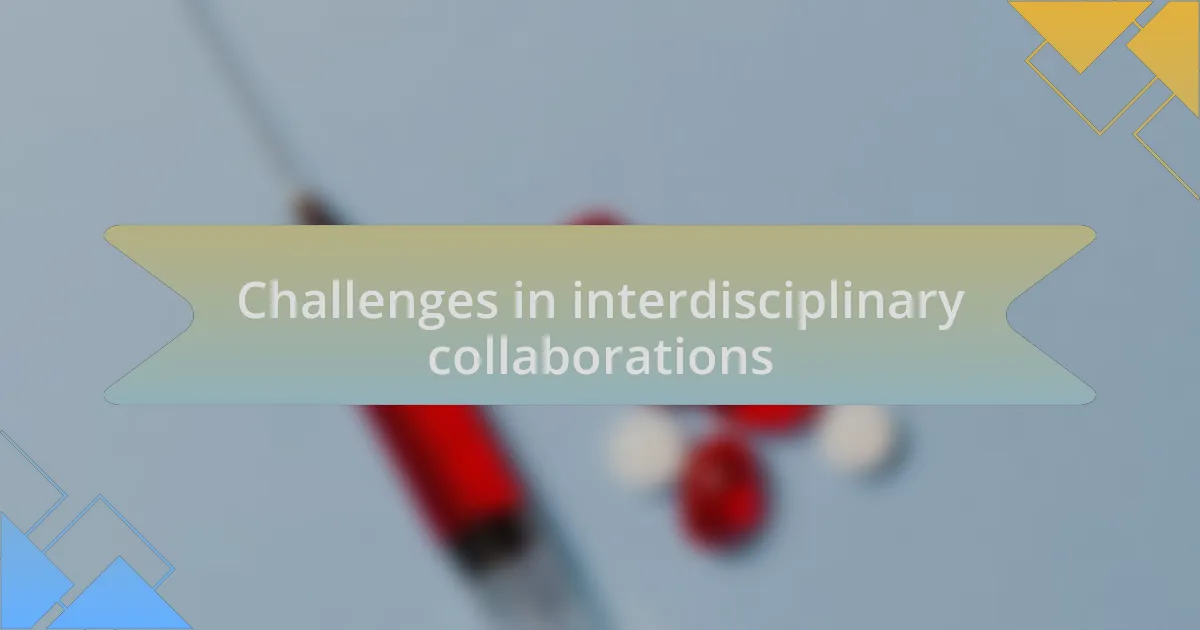
Challenges in interdisciplinary collaborations
Collaboration across disciplines can often feel like navigating a labyrinth. I recall a project where varying communication styles led to misunderstandings among team members. European colleagues prioritized data quantification, while some African partners emphasized qualitative insights. It was challenging to find common ground, yet these very differences could enrich the outcomes if approached with patience and understanding.
Another significant hurdle is the contrasting institutional expectations and bureaucratic processes. In one instance, I faced delays due to differing ethics review frameworks between the two regions. These administrative barriers can stifle momentum and lead to frustration. Have you ever wondered how such challenges impact the enthusiasm and commitment of researchers involved? From my experience, they can create a reluctance to engage fully, risking the potential of what we could achieve together.
Trust-building plays a crucial role in successful interdisciplinary collaborations, yet it often takes time to establish. I remember attending a workshop where skepticism lingered among participants about each other’s motives and capabilities. This tension highlighted the need for sustained efforts to foster trust. Isn’t it interesting how the foundation of collaboration relies as much on interpersonal relationships as it does on technical expertise? In retrospect, I learned that investing time in relationship-building can significantly enhance the effectiveness of our collective efforts.
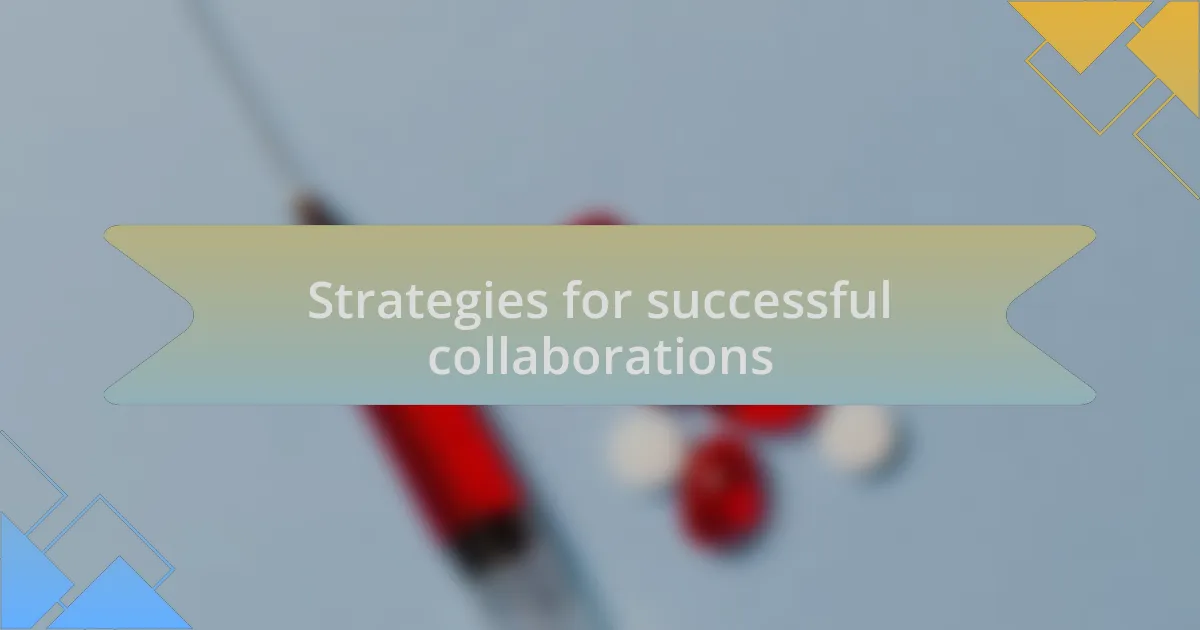
Strategies for successful collaborations
When it comes to forging successful interdisciplinary collaborations, establishing clear communication from the outset is essential. I once participated in a project where we implemented regular check-ins and openly shared updates, which proved invaluable. By creating an environment where everyone felt comfortable expressing their thoughts, we could navigate our diverse perspectives more effectively, ensuring that misunderstandings were swiftly addressed.
Another strategy I found effective was the merging of goals and expectations. In one particular collaborative endeavor, we took the time to align our objectives before diving into the work. This meant having candid discussions about what success looked like for each party involved. It surprised me how this simple step of clarifying our intentions led to a more unified approach, fostering an atmosphere of shared accountability. Have you ever experienced a project where goals weren’t clear? The results can often lead to disappointment and confusion.
Moreover, recognizing and valuing each participant’s expertise is key. During a joint research initiative, I learned to appreciate the strengths my colleagues brought to the table, regardless of their discipline. Their insights contributed to innovative solutions that might not have emerged otherwise. It’s fascinating how acknowledging different skill sets can break down barriers and enrich the collaborative experience. Have you noticed how recognizing contributions can light up a team’s morale? It’s a potent reminder of the power of diversity in interdisciplinary work.
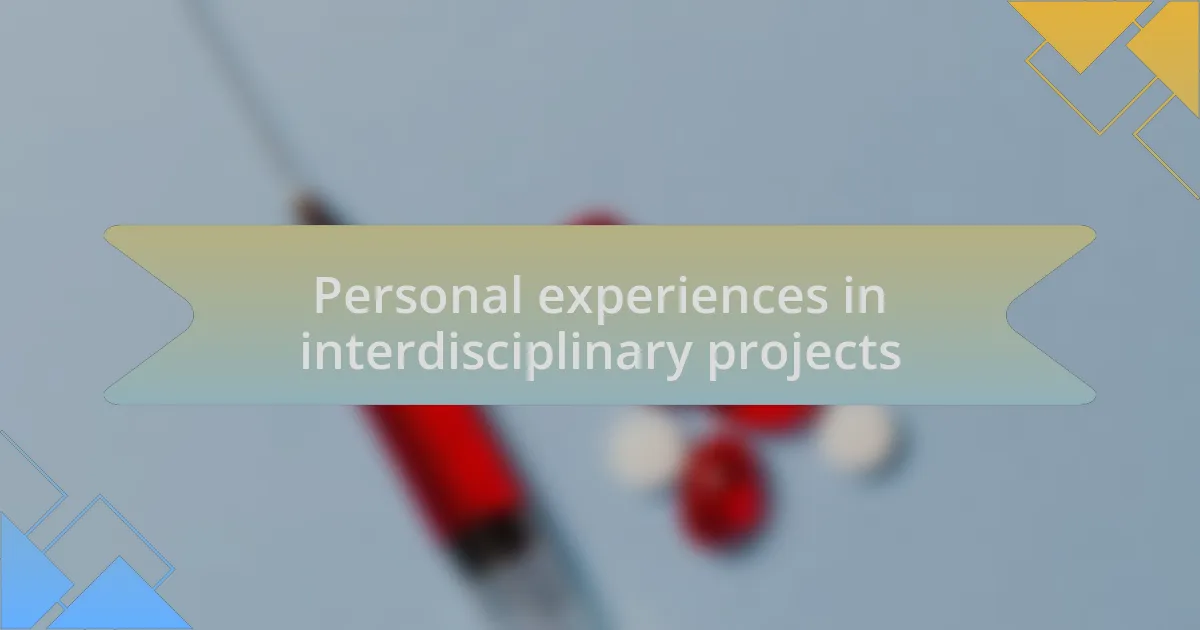
Personal experiences in interdisciplinary projects
Participating in interdisciplinary projects has often felt like a balancing act for me. In one of my past collaborations, I vividly recall feeling both excited and overwhelmed as ideas bounced around the room. The energy was palpable, but it sometimes led to confusion about who was taking the lead. It made me realize that clarity in roles and responsibilities should have been discussed upfront. Have you ever found yourself navigating such a whirlwind of ideas without a clear path? It certainly taught me the importance of defining roles early on.
Another memory that stands out is from a project where we utilized a shared digital platform for our interactions. I remember diving into discussions about our respective methodologies, feeling a mix of frustration and intrigue as we dissected each other’s approaches. It genuinely struck me how discussing our different methodologies forged a deeper connection. Engaging with others’ perspectives was eye-opening and made me wonder, how often do we limit ourselves by sticking only to our own methods? There is so much we can learn from branching out.
Reflecting on a project focused on community health, I was touched by the stories from local stakeholders who had personal stakes in the research. Hearing their firsthand experiences brought to light crucial aspects we had initially overlooked. This connection not only anchored our work in reality but also ignited my passion for making research impact lives. Isn’t it fascinating how personal stories can shift our perspectives? Remembering the faces behind the data serves as a poignant reminder of why interdisciplinary work is not just about the science; it’s about the people it ultimately serves.
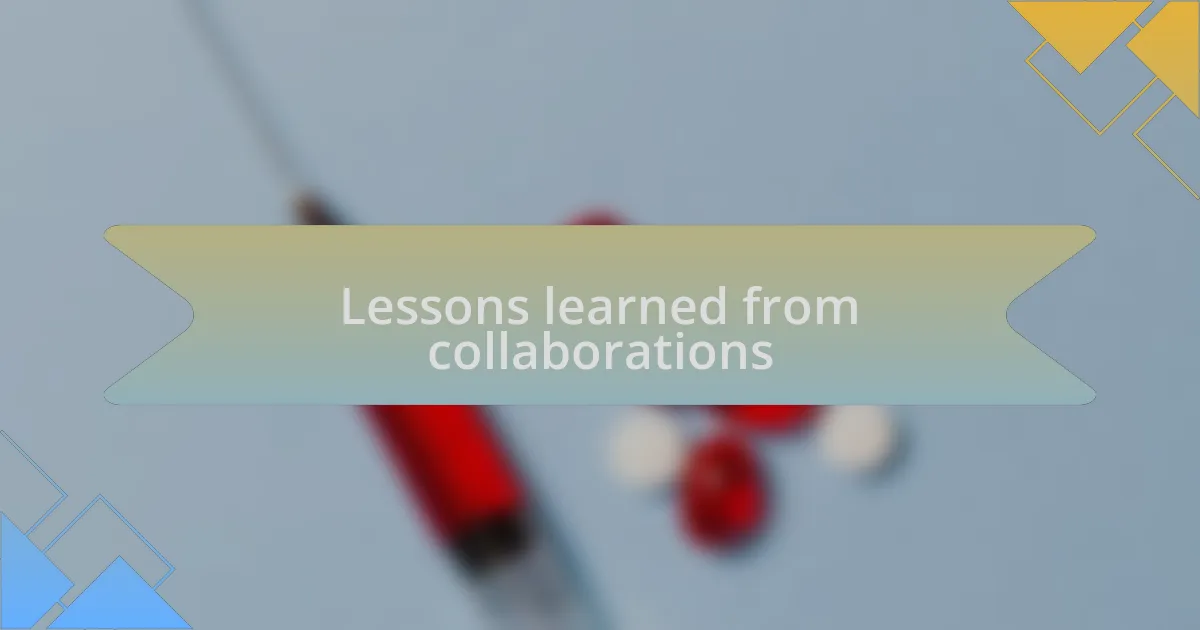
Lessons learned from collaborations
One significant lesson I’ve learned from interdisciplinary collaborations is the power of flexibility. In one project, I encountered a situation where an unexpected challenge required us to pivot quickly. I remember feeling a blend of urgency and collaboration as we brainstormed alternative solutions together. This experience taught me that adaptability not only fosters innovation but also strengthens team cohesion. Have you ever had to pivot in a project? I find that these moments often reveal the best in us.
Communication stands out as another cornerstone of successful collaboration. I recall a time when our team misinterpreted a critical piece of data because we were working across different terminologies. This misalignment led to a delay, but it also sparked a series of discussions that deepened our understanding of each field. Looking back, I appreciate how open dialogue can transform confusion into clarity. Isn’t it remarkable how simply asking questions can uncover hidden insights?
Finally, the importance of patience cannot be overstated in interdisciplinary work. As we navigated differing timelines and expectations, there were moments of frustration when progress felt slow. However, I’ve learned that allowing space for each discipline to contribute at its own pace ultimately enriches the project. Have you ever found yourself yearning for quicker results only to discover that timing is everything? Embracing patience teaches us to value the diverse contributions of our collaborators, which can ultimately lead to more robust outcomes.
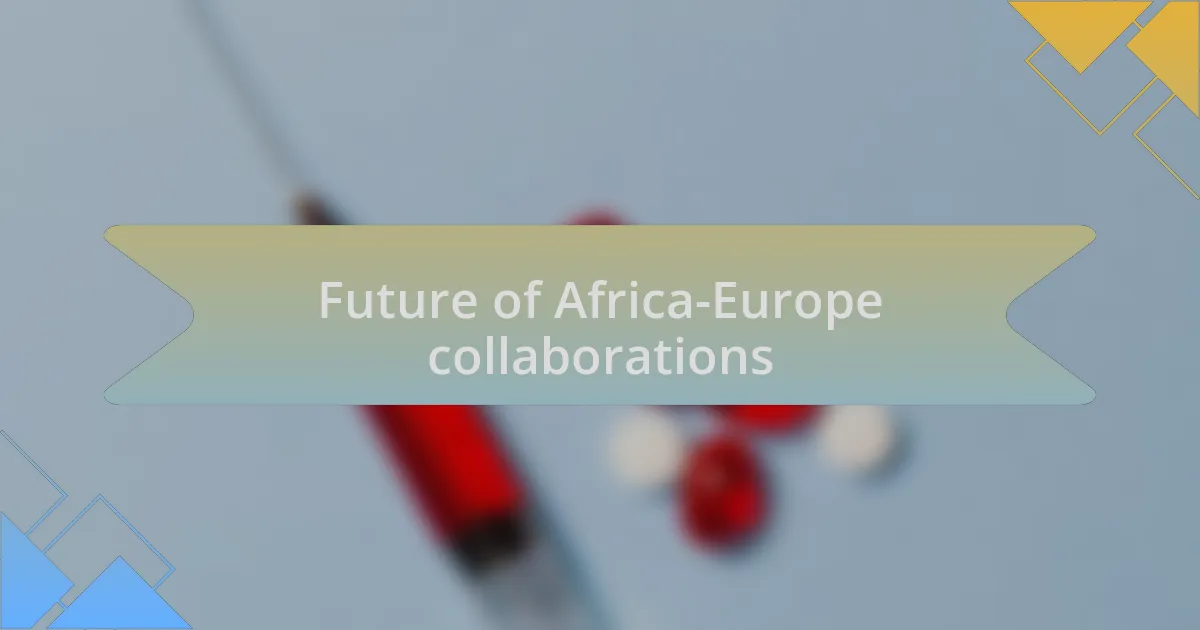
Future of Africa-Europe collaborations
The future of Africa-Europe collaborations seems promising, fueled by a shared commitment to tackling global challenges. I remember attending a workshop where both African and European researchers exchanged ideas on climate change. The passion in the room was palpable, as we all recognized that our collective efforts could lead to groundbreaking solutions. How often do we encounter opportunities that unite diverse perspectives for a common cause? It’s moments like these that reinforce my belief in the power of collaboration.
One emerging trend I’ve noticed is the increasing investment in technology-driven partnerships. In one initiative, our team collaborated with tech experts from Europe to develop solutions tailored for African contexts. The excitement of blending local insights with cutting-edge technology made me realize that innovation thrives on diversity. Isn’t it fascinating how the convergence of different ideas can spark new avenues for growth?
Furthermore, I see immense potential in fostering educational collaborations that empower the next generation. Through joint academic programs, young researchers can gain invaluable cross-cultural experiences. I vividly recall mentoring a bright student who participated in an exchange program; watching her gain confidence and insights from her European counterparts was inspiring. Could such experiences reshape how we view global collaboration? I believe they can, as they prepare future leaders to approach problems with a holistic mindset.